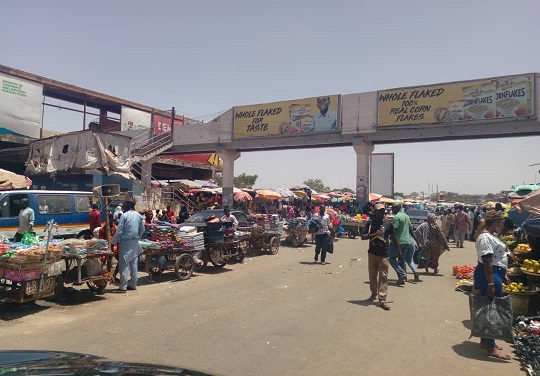This year, Sentient Media reveals that every 60 seconds, one animal suffers abuse. One afternoon, I counted 483 drops of blood on the ground and lost counting to empathy of, what blood is it? But what really transpired?
A wounded cow (with blood flow close to the eye) was being paraded to the slaughtering ground which is about a mile and half (sometimes farther) from the livestock’s market of Yanshanu in Jos. Added to the feeble state of this animal was respiratory mucosa effect, yet a reckless herder (sometimes guy/boy) hit the cow with a goad on the eye wound because at some point, the cow didn’t move/moved slowly (front legs were tied together)–immediately the cow fell to the ground due to force it’s hit. This was repeated until the destination reached. Such oppression is irrefutably done daily.
This scenario conforms argument of Peter Singer, author of Animal Liberation that “it would first be necessary to transform people’s attitude towards animal.” Over 40year ago, animal abuse was referred to intentional acts that cause animals pain, suffering, death–it comes in behaviours like beating, starving, choking etc., however, these maltreatment are rationalized with ‘they’re animals’. But those acts beat conscience.
Yanshanu Livestock Market is a place where buying/selling of livestock are made daily. However due to commercial string, most of the activities of dealers inflict suffering on the animals. Mr Suleiman Ahmad, Chairman Conflict Resolution Yanshanu Market defended tucking livestock in a crevice space all in the name of transportation from villages to the market or from market to some destinations “we’re here for profits, [so] creating such fantasized comfort for animal will cost much [and] I know people don’t want meat costly.”
And on the issue of market herders inflicting unnecessary pain on the livestock while parading them out to eat or when marching them to slaughtering ground, Mr Suleiman agreed that the herders sometimes overdo-it “let me be clear on something, due to unrest in our villages, they [Fulanis] protect their animals with several traditional methods and these sometimes remain after sale–that’s why we used leather [plastic] to choke them when they refused to stand up. However, we caution our boys on mishandling the animals as it’s even Non-Islamic and we put them in check with sanctions, but don’t forget, animals don’t understand you, the goad is the only language they understood, plus there are stubborn ones amongst them.”
Admittedly, African methods of animal husbandry values the goad, but is it most effective means of communication to animal? No – to the extent of cruelty on those animals we consume. This powerful oppression surely affects the health conditions of the livestock, so Mr Alkasim Ishaq, a vetinary outside the Yanshanu Market condemned the recklessness reflecting that those keeping pets starve them, let them stray and cruel soul even beat, talkless of dealers “these people [dealers] are just here for business and time is money for them. Often, we vet around condemn their cruelty towards animals but you know our society [you become a black sheep for trying to better the system]. However, those hard beatings, unreasonable tying does affect health of the animals.”
Whilst the vet expressing his concern, an individual who identified himself as member of Nigeria Livestock Association Plateau Branch lamented his plight on unreasonable tying of animals as torture because it freezes blood flow which explains animals behaviour sometimes.
It’s expected that such vast cruelty by human should’ve been curbed by government, but Mr Suleiman lamented that bad practices should’ve been to past with intervention, “we’ve written letters to government but no respond, so we can do what’s in within our reach. In serious nations, they have abattiors and pay workers, no recklessly beating time to make much money as we have.”
However, putting upto global animal husbandry, the vet and his friend pointed out that reforms need to start from caucus (not learned) that made up of animal bodies. And Mustapha Suleiman, a Vetinary Medicine student of Usman Danfodio University said denial to understand the psychological condition of these guys [as he preferred to call animals] is what brought about abuses in our localities. He believed if we pay good attention, we wouldn’t need to inflict pain on animal with our traditional techniques.
But, it’s worrisome what the rigour of herders on animals is costing the host community – Yanshanu. The livestock market is located in full residential area. Often, the maltreatment gets animal wild – it go about for half an hour chaotic for everyone as to when the creator appease in worst cases.
This discriminating treatment persist because human fail to realize livingthings respond to stimuli – sometimes they’re feeble, like, dislike, hungry, angry, sick even want to rest, only when this is understood, we’d think of it as wrong to inflect needless suffering on another being, even if not our own species. But attractive legislation on the subject matter is priority.
Abdulslam Kamaldeen Muhammad writes from Bayero University Kano, with
Abdulsalam Zikirullahi (SS3 Class) Alhaqq Comprehensive Private School Jos,
Rukaiyah Muhammad (SS2 Class) Alhaqq Comprehensive Private School Jos,
Rabiatu Abubakar (SS2 Class) Alhaqq Comprehensive Private School Jos.





